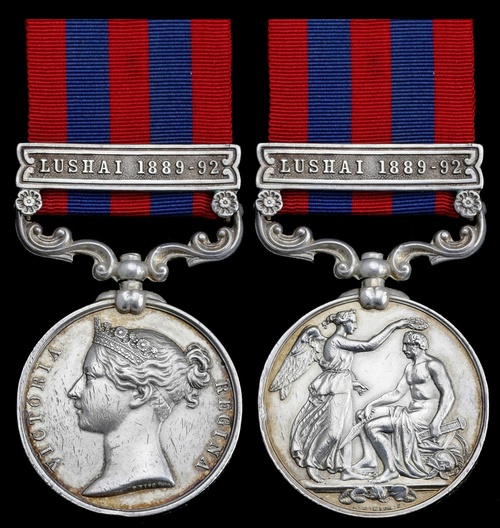
Auction: 18001 - Orders, Decorations and Medals
Lot: 130
'Personally I look upon the whole business as one of the most creditable things to the British Army which has ever occurred, and without invidious comparison quite as creditable as the Birkenhead, for in the latter, if we are to believe the pictures, the men were at least all on deck, whilst on the Warren Hastings they were between decks, and...quite unable to see what was going on.'
An officer present later writing of the loss of the Warren Hastings.
The India General Service Medal awarded to Private J. Cooper, King's Royal Rifle Corps
India General Service 1854-95, 1 clasp, Lushai 1889-92 (6149 Pte. J. Cooper, 4/K.R.R.C.), an official replacement in engraved capitals, as issued to those who lost their medals in the Warren Hastings, edge bruising and contact marks, nearly very fine
One of 103 such awards issued to the K.R.R.C., Cooper having served in ‘A’ Company of the 4th Battalion. He subsequently qualified for the India General Service 1895-1902 for 'Relief of Chitral 1895', and the Queen’s South Africa Medal with clasps for 'Cape Colony', 'Relief of Ladysmith' and 'Tugela Heights', and was among those members of his regiment present at the loss of the Warren Hastings in January 1897: - An account by Lieut.-Colonel M. Forestier-Walker at Mauritius on 28th January 1897 takes up the story:
‘On 6 January 1897, the Warren Hastings, commanded by Commander G. E. Holland, D.S.O., Royal Indian Marine, sailed from Cape Town for Mauritius. The passengers principally consisted of a half battalion of the King's Royal Rifle Corps, half a battalion of the York and Lancaster Regiment and detachments of the Middlesex Regiment. A good passage was had until the morning of the 13th, when the glass fell and the wind shifted to the south. Despite reduced visibility there was no cause for concern and that night the troops went untroubled to bed. At about 2.20 am on the 14th, a violent shudder was felt throughout the ship. Orders were given for the K.R.R.C. to fall in on the port side and the York and Lancasters on the starboard side. Through the torrential rain tropical ship's officers perceived that the vessel was aground and that it was possible to disembark by ropes on to the rocky coast of what later turned out to be the island of Reunion. At 4.15am the ship began to heel to starboard. Twenty minutes later the electric lights went out. Thus by 5.00 am those men on the starboard side, some in total darkness, were standing knee deep in water. The list gradually increased until the captain himself thought the ship would turn over.
Nevertheless the discipline for which the British soldier is famed prevailed, and the disembarkation was accomplished without a single fatality. The only lives lost during the whole episode were those of two natives who ran amok and jumped overboard.'
Officers and men in various states of undress were subsequently conveyed to Mauritius, 120 miles away, in a British India ship, the Lalpoora. Upon arrival on the 18 January all the officers were received by the Governor, Sir Charles King Harman. The dinner given that night at his residence, Reduit, was by all accounts ‘a curious sight.'
Reference sources:
The Wreck of the R.I.M.S. 'Warren Hastings' and Medals to the 1st King's Royal Rifle Corps; A new naming style?, by I. L. Mortenson, The Orders and Medals Research Society of America Journal, Spring 1991
The India General Service Medal of 1854 to the 4th King's Royal Rifle Corps, by Langridge and Mortenson, Medal News (Token Publishing, December 1993/January 1994 double-issue).
Subject to 20% VAT on Buyer’s Premium. For more information please view Terms and Conditions for Buyers.
Sold for
£320




